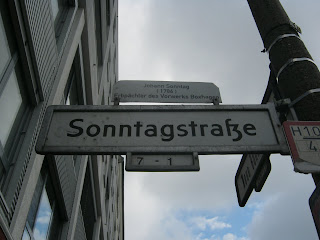Having finally found and signed a contract for a roof over my head, I can finally post this route without the fear of jinxing my flat search. Which has been hard. I described some of the trickiness in an earlier
post; stressful block viewings, going through an application process without all the information that the landlord normally wants, and waiting to hear back from estate agents... and usually not.



As a tenant you have far more rights in Germany than in England. This might explain why German home ownership is only around 45% compared to the UK's 70%. In Berlin, its as low at 15%. You only have to give three months notice before leaving a property (even if you've just moved in) and you can decorate it in the way that you want. Indeed, you are expected to. Flats are almost all unfurnished and the majority have only a sink in the kitchen (is this where the expression 'everything but the kitchen sink' comes from?). Our contract states that we have to do it up every 3-5 years (depending on which room it is!) or we will get charged at the end of the tenancy. When we leave, we can either pay this or leave it in a decorated state that we have negotiated with the 'Nachmieter' (next tenant). But it means that a rented property can feel like a home in the way I haven't experienced in London. You can paint the walls, put up shelves, put in a new kitchen even. No wonder tenancy periods are so much longer here.
Another big difference is the relative absence of estate agents. Much of the letting work is done by the current or potential tenants themselves. There are online property sights which contain lists of available properties (e.g.
Immobilienscout 24 or
Wg-Gesucht). But it is often the Nachmieter who posts these adverts online - or as the photos from my run show - just on the street posts in the surrounding area. In Berlin, people often offer their flat in exchange for another - and so you also see lots of posters up advertising that someone is looking to swap their flat for a bigger/smaller one in the same/different area. The estate agent's role seems to be primarily collecting in the information and passing it back to the estate agent and sometimes putting a property advert online and organising block viewings. They are far smaller and less assertive (not always a good thing) outfits than in London and no sign of mini coopers anywhere!
Getting a flat share is far easier and a bit cheaper. The same sites provide listings, as do numerous street corners in the area that you fancy.
Top five tips if you want to rent your own flat:
1) I know it sounds obvious, but
make sure you have at least basic German: you need to be able to good enough to pick up the phone and speak as people are not always hot on answering emails.
2)
Give yourself at least a month and be prepared to be let down. Its not enough to turn up, like the flat and pay the deposit; here you have an application process.
3)
Have as much information on your credit/income history to hand as possible. You need to have proof of monthly income and that you don't owe any rent to your previous landlord or have a bad credit rating (a Schufa report). If you don't have these because you've just moved out, try to bring the equivalents with you from home and get an Experian credit check. A expat forum called
Toytowngermany is pretty good on navigating bureaucracy.
4) Make sure you
find out the 'Warmmiete' price. This is the rent plus building, heating and water costs. 'Kaltmiete' is just the price of the rent alone.
5) If all else fails, there are some helpful English speaking agencies such as
Fine and Mine and
Rooms in Berlin but they are more expensive and will charge you a fee.






























